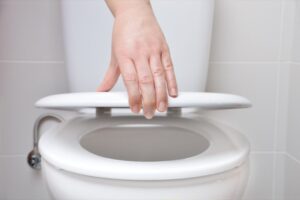Early Signs Of Prostate Cancer, Say Physicians
Prostate cancer is a leading cause of death for men in the US, second only to skin cancer—but early detection can make a huge impact on outcomes.
“When prostate cancer is diagnosed before it spreads to other parts of the body, about 97% of people live at least five years after diagnosis,” says urologist Christopher Weight, MD.
Here are five signs of prostate cancer you should never ignore. Read on—and to ensure your health and the health of others, don’t miss these Sure Signs You’ve Already Had COVID.
1. Trouble Urinating

Trouble urinating is a common symptom of prostate cancer. “The prostate typically enlarges as men age, which is called benign prostatic hyperplasia (BPH),” says Dr. Jonathan Briggs, a board-certified radiologist and radiation oncologist at Beaufort Memorial Radiation Oncology.
“The prostate surrounds the urethra, which carries urine from the bladder out of the body. An enlarged prostate can squeeze the urethra and make it more difficult for urine to pass through. Difficulty urinating can be a sign of prostate cancer, but BPH is the likelier cause in most men. Prostate cancer typically causes symptoms only when it’s advanced.”
2. Back Pain

Unexplained back pain could be a sign of prostate cancer, doctors say. “There can be a connection between back pain and prostate cancer, but back pain alone is not necessarily a sign of the disease,” says Yamini Ranchod, PhD, MS.
“In advanced prostate cancer, cancer cells spread beyond the prostate to other parts of the body. These cells usually spread to the bones first, and doctors refer to this as bone metastasis. If prostate cancer spreads to the bones, it most often reaches the spine, ribs, and hips. This occurs in stage 4 prostate cancer, and it can cause pain. According to ZERO, an advocacy group, bone metastases will affect more than 60 percent of men with advanced prostate cancer. Individuals with chronic back pain that has no obvious cause should see a physician for an evaluation.”
3. Blood In Urine

Blood in the urine could be a sign of prostate cancer (or other health conditions) and should not be taken lightly. “Should it be bladder cancer or another serious condition, any delay in treatment greatly compromises treatment and cure rate,” says urologist Robert Abouassaly, MD.
4. Pain When Sitting Down

Feeling pain in your prostate could be an early (although rare) sign of prostate cancer. Anyone feeling prostate discomfort when sitting down should speak to a doctor. “This could also indicate a prostate infection, but only your urologist can say for certain,” says Dr. Weight.
5.Excess Weight and Prostate
Maintaining a healthy weight is important for lowering prostate cancer risk, doctors say. “Being overweight or obese may increase your risk for certain types of prostate cancer,” says Dr. Briggs. “Maintaining a healthy weight may lower your risk. You can do that by exercising regularly and making healthy dietary choices, such as eating lots of fruits, vegetables and whole grains, and eating less red meat and fewer processed foods.”















Post Comment